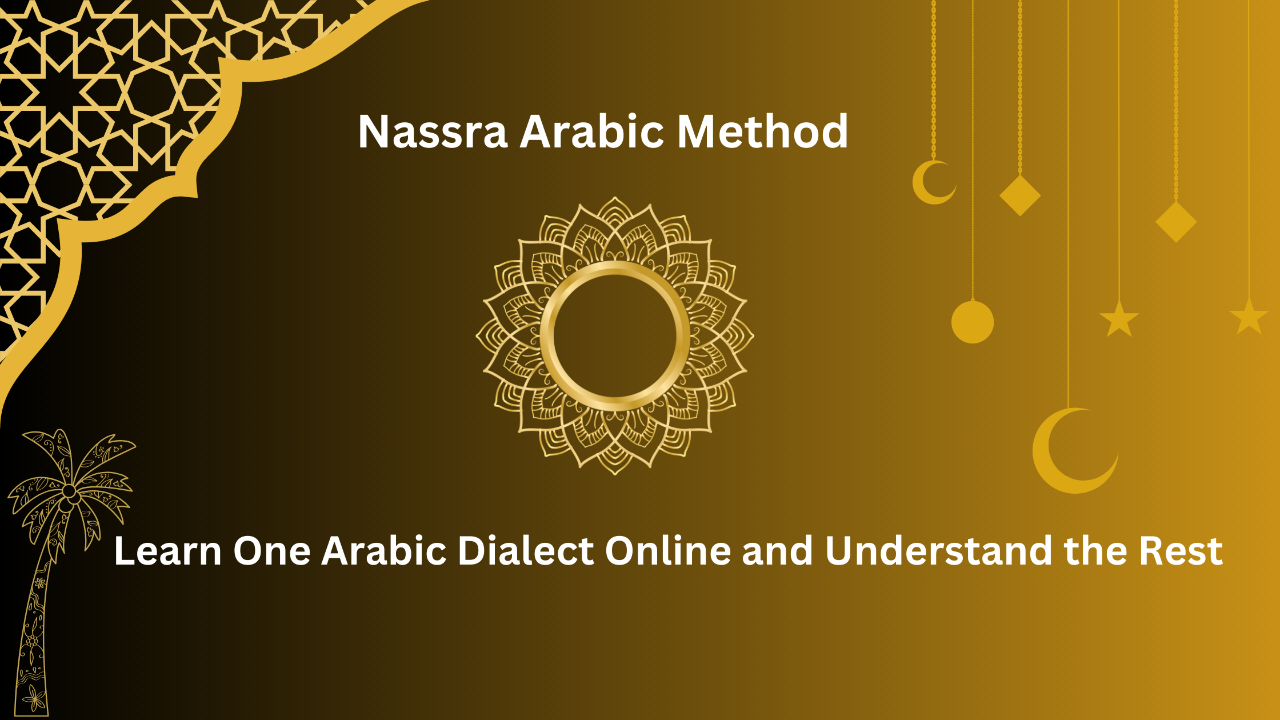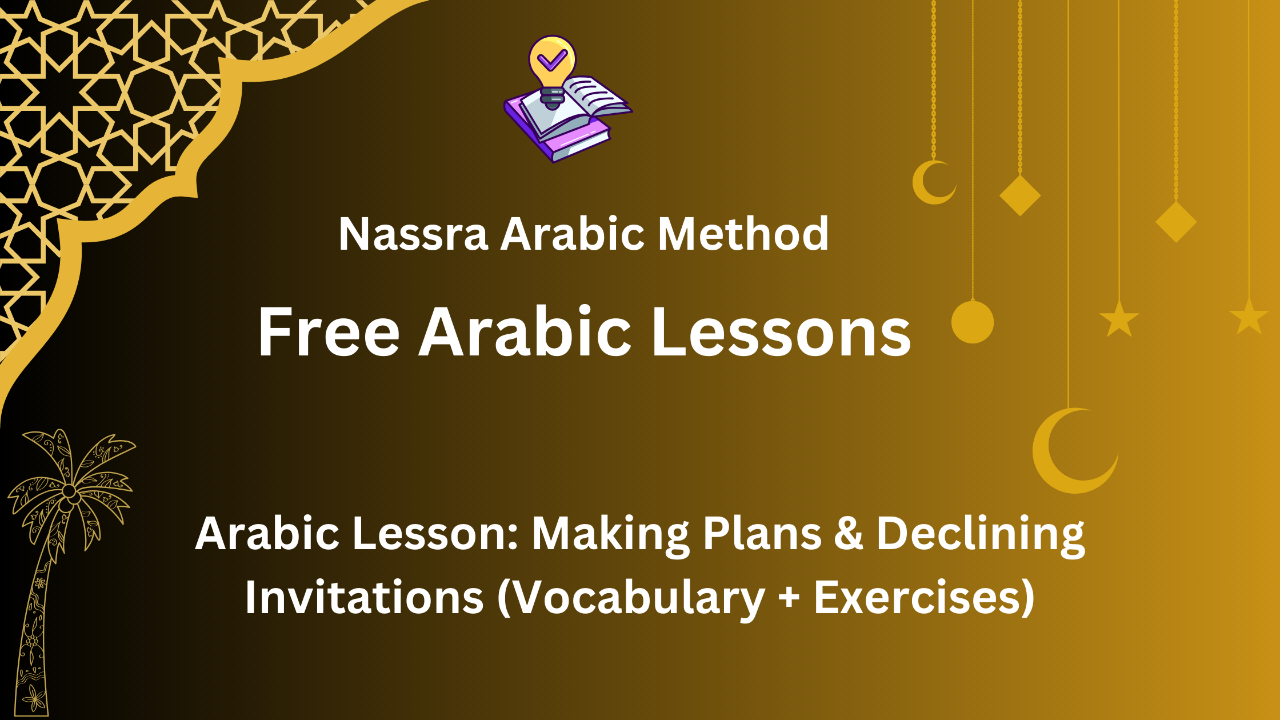Learn Arabic Online For Free
Start your journey to fluency with free Arabic lessons from the Nassra Arabic Method, founded by Omar and Khaled Nassra. We provide proven strategies to learn Arabic correctly and efficiently, whether your goal is conversational fluency in Levantine/Gulf dialects or professional Business Arabic.
Learn One Arabic Dialect Online and Understand the Rest: Your Shortcut to Fluency

Imagine unlocking the vibrant world of Arabic with just one key. Did you know that Arabic has 3 main standard dialects, but mastering a single one—like Levantine, Gulf, or Egyptian—can help you understand many others? If you’re eager to learn Arabic, focusing on one dialect isn’t just practical—it’s a proven strategy to fast-track your fluency across the Arab world. Let’s dive into why this works, how to pick the right dialect, and the best ways to get started online. By the end, you’ll be convi...
Free Arabic Lesson : Making Plans & Declining Invitations (Vocabulary + Exercises)

Free Arabic Lesson: Mastering Levantine Arabic Through Everyday Conversations
Welcome to this exciting Levantine Arabic lesson! Today, you’ll step into a real-life conversation between Sarah and Rami as they try to make plans. This lesson will help you learn practical vocabulary, improve your pronunciation, and practice with engaging exercises. Whether you’re new to Arabic or looking to sharpen your skills, this lesson is perfect for you. Let’s dive in and explore the vibrant world of Levantine...
Al Madina Arabic vs. Nassra Arabic Online Method: Best Way to Learn Arabic

Al Madina Arabic vs. Nassra Arabic Online Method: Which Is Best for Your Arabic Learning Goals?
Learning Arabic opens doors to a vibrant culture, rich history, and over 400 million native speakers across 22 countries. But with so many approaches—formal Arabic, spoken dialects, or Quranic recitation—where do you start? Two standout online platforms, Al Madina Arabic and Nassra Arabic Online Method, cater to different needs. Whether you want to master the Quran, chat with locals in Dubai, or re
...Learning the Arabic Alphabet: Your Gateway to Fluency in Arabic

Learning the Arabic Alphabet
Imagine strolling through a vibrant market in Cairo or Beirut, the air buzzing with voices, the signs bursting with colorful script. You want to order a steaming plate of shawarma or ask for directions—but the letters on the menus and street signs look like elegant, indecipherable squiggles. Sound familiar? That’s where the Arabic alphabet swoops in to save the day. It’s not just a collection of 28 letters; it’s your key to unlocking fluency in both Modern Standar
...Is Modern Standard Arabic Used In Everyday Conversation?

Modern Standard Arabic
Have you ever wondered if Modern Standard Arabic (MSA) is the language you’d hear in bustling markets or cozy coffee shops across the Arab world? If you’re learning Arabic—or just curious about how it’s spoken—this question is a big one. In this blog, we’ll explore whether MSA is used in everyday conversation, backed by clear facts and examples, and optimized for anyone searching for answers. Let’s dive into the world of Arabic!
What Is Modern Standard Arabic (MSA)?
M...
Why Do 95% of Arabic Learners Quit Within 3 Months?

Why Do 95% of Arabic Learners Quit Within 3 Months? Here’s How to Beat the Odds
Learning Arabic is a dream for many, but a staggering 95% of learners abandon it within the first three months. Why does this happen, and how can you avoid being part of that statistic? The answer lies in the disconnect between traditional teaching methods and what learners actually need to succeed. In this blog, we’ll uncover the reasons behind this dropout rate, backed by facts, and share practical solutions
...Why Arabic is Consider A Hard Language To Learn

Why Arabic Feels Like a Mountain to Climb—and How We Make It a Joyride
Arabic has a notorious reputation as one of the trickiest languages for English speakers to learn. If you’ve ever tried tackling it and found yourself drowning in grammar rules or lost in a sea of unfamiliar letters, you’re not alone. The frustration isn’t just in your head—it’s baked into how Arabic is often taught. Too many programs focus on dusty textbooks and Classical Arabic, leaving you unprepared for real conversati
...3 Ways to Say “How Are You?” in Arabic (With Cultural Tips!)

3 Ways to Say “How Are You?” in Arabic (With Cultural Tips!)
Learning basic greetings is the first step to connecting with Arabic speakers. Whether you’re traveling to the Middle East, practicing with friends, or exploring the language, knowing how to ask “How are you?” in Arabic opens doors to warm conversations. Below are three common ways to ask this question, along with pronunciation guides, cultural insights, and example responses.
1. كَيْفَ حَالُكَ؟ (Kayfa Ḥāluka?) – Formal/Standar...
How To Improve Your Listening Skills When Learning Arabic

How To Improve Your Listening Skills When Learning Arabic: A Clear and Engaging Guide
Improving your listening skills in Arabic can feel challenging—those unique sounds, diverse dialects, and fast-paced conversations might seem overwhelming at first. But here’s the good news: with the right strategies, it’s not only doable but can also be a fun and rewarding part of your language journey! Whether you’re a beginner decoding the Arabic alphabet or an intermediate learner aiming for fluency, thi
...Compare Levantine vs. Gulf Arabic: A Comprehensive Breakdown

Compare Levantine vs. Gulf Arabic: A Comprehensive Breakdown
Levantine and Gulf Arabic are two vibrant dialects of the Arabic language, each shaped by its region’s history, culture, and daily life. While they share a common foundation in Classical Arabic and Modern Standard Arabic (MSA), they diverge in ways that make them distinct yet interconnected. This expanded comparison dives deep into their geographical spread, pronunciation nuances, vocabulary differences, grammatical structures, cultur...


